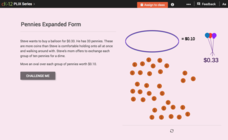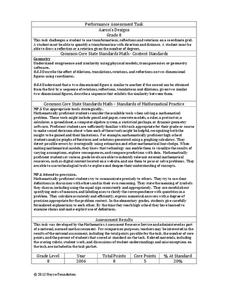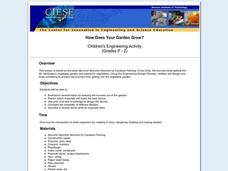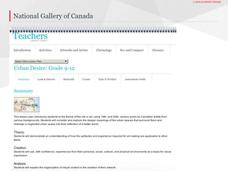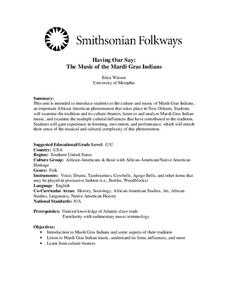University of Colorado
Terra Bagga
Earth's magnetic poles switch positions about every 200,000—300,000 years. In the activity, groups create a planet with a magnetic field. Once made, they use a magnetometer to determine the orientation of the planet's magnetic field....
Constitutional Rights Foundation
Driver’s Licenses And Unauthorized Immigrants
Should driver's licenses be granted to unauthorized immigrants? That is the question class members grapple with in a lesson that asks them to first read a fact sheet that details the arguments for and against licensing unauthorized...
Chicago Botanic Garden
GEEBITT (Global Equilibrium Energy Balance Interactive TinkerToy)
Young scholars use the GEEBITT excel model to explore how global average temperatures are affected by changes in our atmosphere in part two of this series of seven lessons. Working in groups, they discuss, analyze graphs, and enter data...
NOAA
Build Your Own Ocean Ecosystem
Hold the sea in the palm of your hand! Amateur oceanographers work together to create models of an ocean ecosystem in the sixth and final installment in a series. Raise awareness of global ocean health issues through guided research,...
CK-12 Foundation
Numbers in Expanded Form: Pennies Expanded Form
Beginning with a word problem that poses the question of making groups of 10 pennies to translate into a single dime, pupils are challenged to make sense of the amount of dollars 33 cents is in expanded form.
Virginia Department of Education
Using Order of Operations and Exploring Properties
If you need some creative ways to teach the order of operations, use a series of activities that focus on properties. Each lesson uses different materials and works as a stand-alone activity, or can build upon the concepts of the last...
EduGAINs
Understanding Viscosity through Investigation and Comparison of Fluids
Not all liquids are the same. Investigate the viscosity of different fluids with a series of activities designed for eighth grade science. As learners move through learning centers with different experiment setups, they determine...
Inside Mathematics
Aaron's Designs
Working with transformations allows the class to take a turn for the better. The short assessment has class members perform transformations on the coordinate plane. The translations, reflections, and rotations create pattern designs on...
For the Teachers
Story Strips Sequencing
What happens next? Work on story sequence with a lesson that prompts kids to put a story back in order. Additionally, they discuss what would happen if one event was missing from the sequence.
Reed Novel Studies
The Homework Machine: Novel Study
Do opposites really attract? The D Squad in The Homework Machine includes of a quad of opposites. The group, made up of a teacher's pet, a geek, a class clown, and a slacker, make use of a machine to do their homework. In response...
Steven's Institute of Technology
How Does Your Garden Grow?
What to do, bunnies are getting into the garden and eating all the carrots! After reading the story Muncha! Muncha! Muncha! the class works together to design a device that will keep those bunnies out of the garden. They get together in...
National Gallery of Canada
Urban Desire
Urban spaces are often overlooked and broken down. Offer your pupils the opportunity to reimagine an urban space. Learners examine and discuss works of art related to this theme and consider their own communities. Small groups then...
Curated OER
Rational Number Project
Infuse your unit on fractions, decimals, and operations with a thorough module about rational numbers. With a teaching guide, learner examples, templates for instruction, and lesson rationale, the module is a solid way to...
Voices of a People's History
Voices in The Classroom
Everyone's perspective of the past is different. A thought-provoking unit gives young academics the opportunity to explore their perspectives on history and their neighborhoods. Based on the work of Howard Zinn, each lesson explores...
Middle Tennessee State University
Who's Afraid of the Big Bad Wolf? A Comparison in American Culture
As part of their study of the Progressive Era, class groups examine a 20th century version of "The Three Little Pigs" through a New Era lens and identify how ideals such as the value of hard work, creativity, and problem solving,...
Wild BC
Is Climate Change Good for Us?
Is it really that big of a deal if the global climate undergoes a little change? Young environmentalists consider this very question as they discuss in small groups the impact of different climate change scenarios on their lives,...
Curated OER
Committing to Respect: Lessons for Students to Address Bias
Here's a guide designed to build safe, respectful learning environments, and to build understanding of the value of diversity through lessons packed with activities for specific grade levels.
American Chemical Society
Molecules Matter
Did you know that jumping spiders sometimes wear water droplets as hats? A seventh grade science instructional activity introduces the concept of what makes up water: tiny molecules that are attracted to each other....
City University of New York
Urban Politics: Machines and Reformers
Take a trip to the turn of the twentieth century with a resource about industrialism in America. With primary source documents and focus questions, learners think about the ways that government groups and organizations paved the way...
Smithsonian Institution
The Music of the Mardi Gras Indians
The traditions, costumes, and the music of the Mardi Gras Indians, African-Americans and those with African American or Native American Heritage are the focus of a unit that introduces class members to a little-known group that...
DiscoverE
Hold Your Water
Let's hope there are no leaks. Pupils work together in groups to build a device that will keep as much water as possible in a cup. After being dropped from a height of seven feet! Time to haul out the ladder.
DiscoverE
Build a Bridge
Cost overruns are unacceptable—in the real world and in an engaging activity. Groups of pupils get together to build a bridge out of straws, paper cups, and tape. They keep track of costs ($1,000 for each material) and must stay within a...
PBS
Myth of the West: Lonely But Free I’ll Be Found
Tumbling tumbleweeds! Scholars work with video clips, primary and secondary documents, and song lyrics to uncover life in the Old West. They examine song's lyrics to uncover myths told in the 1930s about life in the Wild West.
National Museum of the American Indian
The Kwakwaka'Wakw: A Study of a North Pacific Coast People and the Potlatch
Discover the cultural practices and unique value systems of a group of native peoples from Canada called the Kwakwaka'wakw. Your young historians will discuss how conceptions of wealth can vary and how these native...




